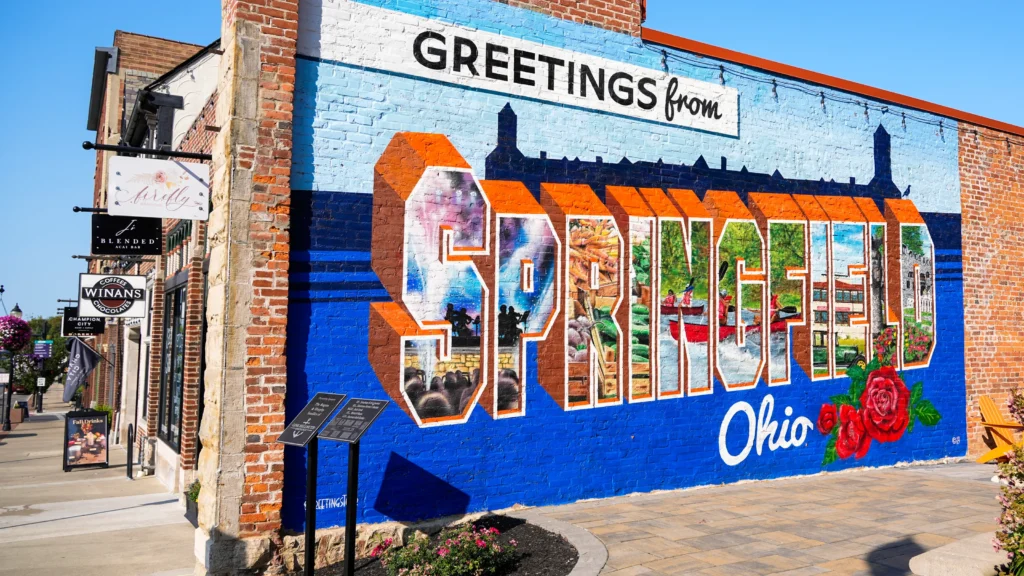
Springfield, Ohio, has faced a wave of political attacks directed at its immigrant population and local businesses. Amidst this tumultuous environment, the community has demonstrated remarkable resilience and solidarity. Residents have rallied together to support their neighbors and immigrant-owned businesses, pushing back against the divisive rhetoric perpetuated by political figures, including President Trump and Senator J.D. Vance.
The political discourse surrounding Springfield has been heavily influenced by national narratives that often target immigrant communities. Figures like President Trump and Senator Vance have utilized rhetoric that frames immigrants as threats to economic stability and cultural identity. Such messages resonate in certain segments of the population, but they also provoke strong backlash from community members who recognize the essential role immigrants play in enriching local culture and driving economic growth.
“But for the immigrants who bear the brunt, these vicious lies and racist stereotypes are no laughing matter. Trump and Vance have unleashed a firestorm of racial hatred and violent threats. Two days after the debate, bomb threats forced the evacuation of Springfield City Hall, two schools and a state motor vehicle facility.”
Marc Morial, President and CEO, National Urban League
In Springfield, the political attacks have created an atmosphere of fear and division, particularly among immigrant business owners who often rely on their local networks for support. However, rather than succumbing to despair, residents have mobilized to counteract these narratives, emphasizing the importance of inclusivity and community support.
One of the most impactful responses to the political climate has been the emergence of grassroots initiatives aimed at supporting immigrant-owned businesses. Local organizations and residents have launched campaigns to highlight the contributions of these businesses to Springfield’s economy and culture. Initiatives such as “Support Local” days have encouraged residents to patronize immigrant-owned shops and restaurants, fostering an atmosphere of solidarity and appreciation.
Legal immigrants didn’t only provide labor in Springfield, but also boosted the vitality of downtown. Caribbean food trucks and restaurants brought new energy to sleepy streets. Haitian Flag Day became a popular annual event. On Sundays, the prayers and song from the St. Raphael Church, where there has been a regular afternoon Haitian Creole Mass, filled the air. Until recent months, immigrants were understood locally to be integral to the fact that Springfield was standing strong once again.
Julian Zeller, Princeton University
For instance, community events have been organized to celebrate cultural diversity, featuring food festivals that showcase the cuisines of Springfield’s immigrant communities. These gatherings not only support local businesses but also educate the broader community about the value of diversity. Residents have reported feeling a renewed sense of pride in their town, recognizing that the strengths of Springfield lie in its varied cultural fabric.
“Springfield has a rich history of providing refuge for the oppressed and being a place of opportunity. As a stop on the Underground Railroad, the Gammon House, which still stands, was a safe haven for escaped slaves seeking freedom. And, as a stop on the Old National Road, America’s first east/west federal highway, Springfield attracted many settlers both before and after the Civil War. Immigrants from Ireland, Greece, Germany, Italy and other countries helped build the city into what it is today.”
Ohio Governor Mike DeWine, Republican
Another key aspect of Springfield’s community response has been the focus on education and dialogue. Local advocacy groups have organized workshops and discussion panels aimed at fostering understanding between different cultural groups. By creating spaces for open conversation, these initiatives have allowed residents to share their stories, dispelling myths and misconceptions about immigration.
Educational outreach efforts have also targeted local schools, where programs that promote inclusivity and cultural understanding have been introduced. By engaging with the younger generation, the community is fostering a more compassionate and informed citizenry, better equipped to counteract divisive political rhetoric.
The community’s resilience has also been bolstered by the emergence of local leaders who champion the rights and contributions of immigrant populations. These leaders, often immigrants themselves, have taken on roles in local government and community organizations, advocating for policies that protect immigrant rights and promote economic development.
Local business owners have formed alliances, creating networks that provide resources and mentorship to new entrepreneurs. This collaboration not only strengthens the business community but also amplifies the voices of those who have been marginalized in political discussions. The emphasis on mutual support and empowerment has instilled a sense of agency among residents, fostering a collective identity rooted in resilience.
The challenges facing Springfield, Ohio, are emblematic of broader national tensions surrounding immigration and cultural diversity. However, the community’s response serves as a powerful testament to the strength of solidarity and resilience. By coming together to support their neighbors and immigrant-owned businesses, Springfield residents are not only countering political attacks but also redefining what it means to be a community.
As Springfield continues to navigate the complexities of its political landscape, the efforts of its residents provide a blueprint for fostering inclusivity and understanding. Through education, community engagement, and grassroots activism, they are shaping a future where diversity is celebrated, and every resident feels valued. In doing so, they affirm that the true strength of their community lies in its unity, compassion, and unwavering support for one another.